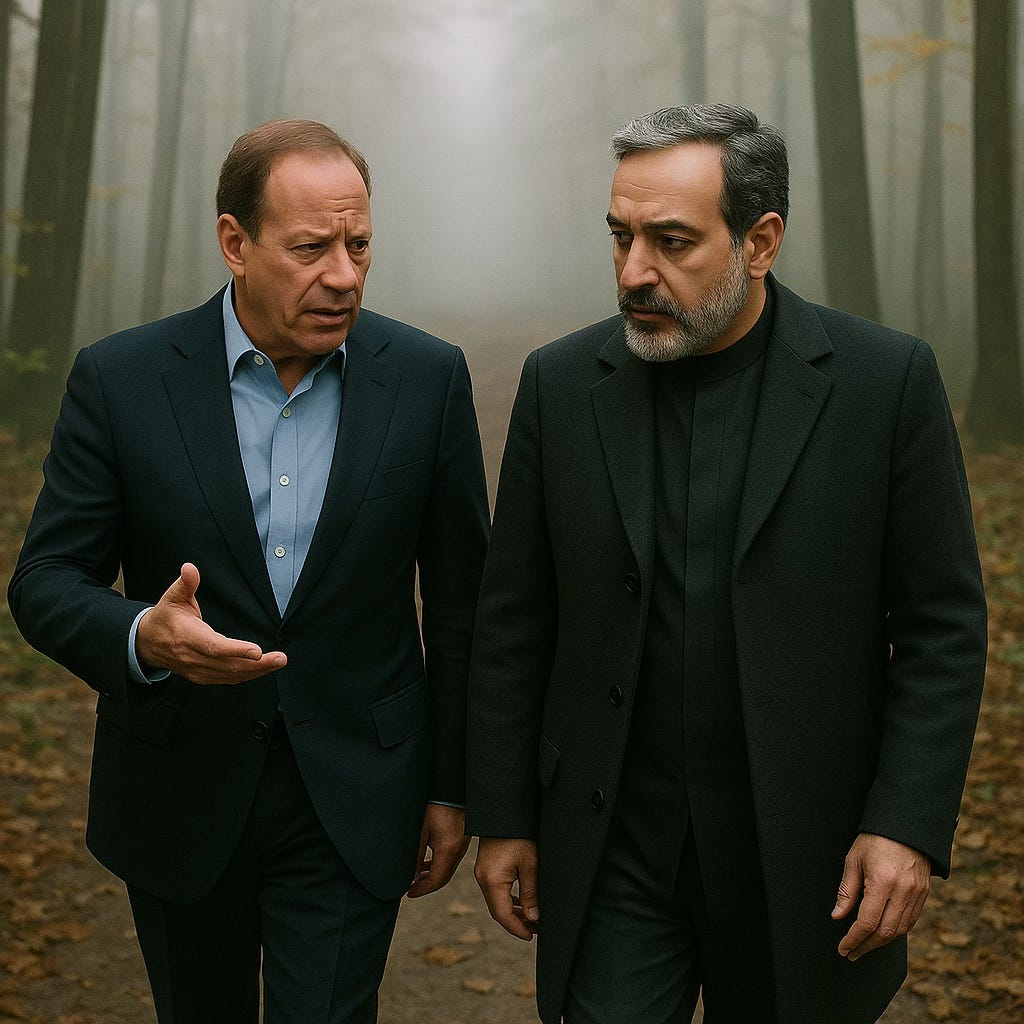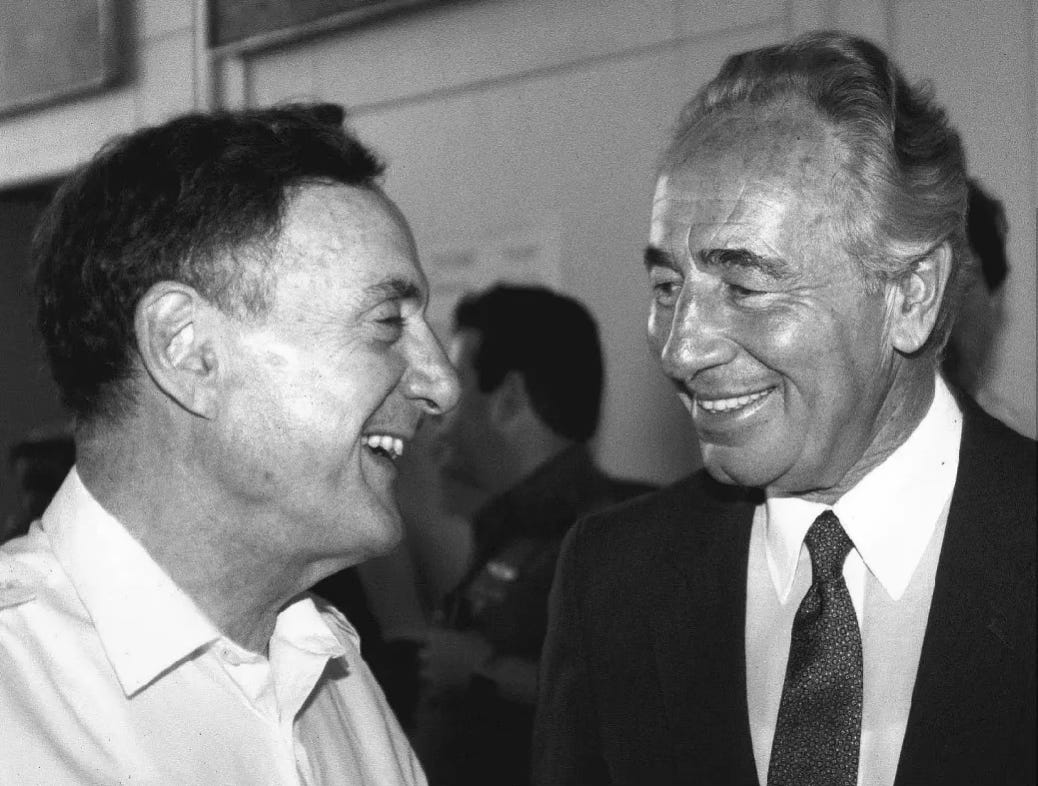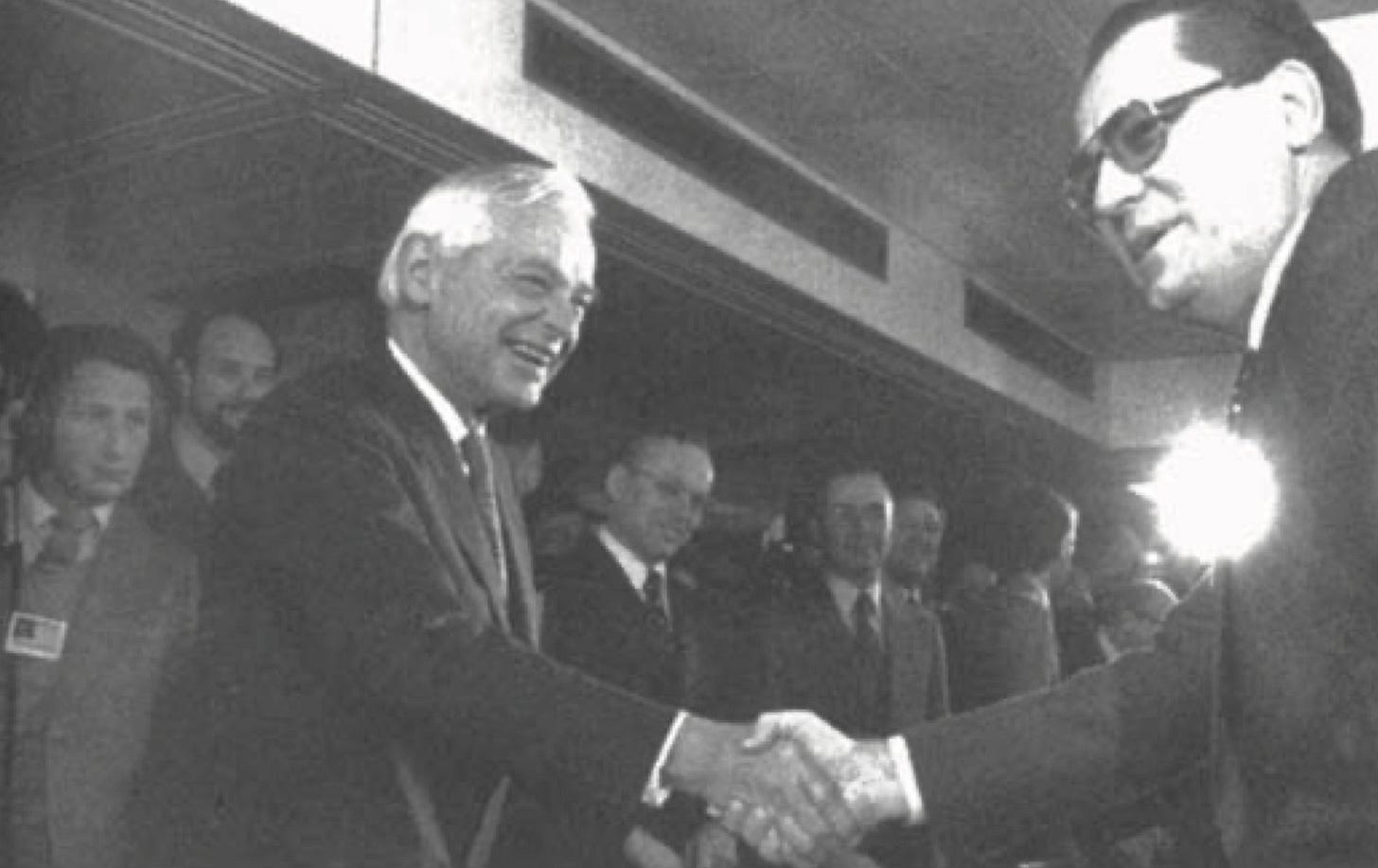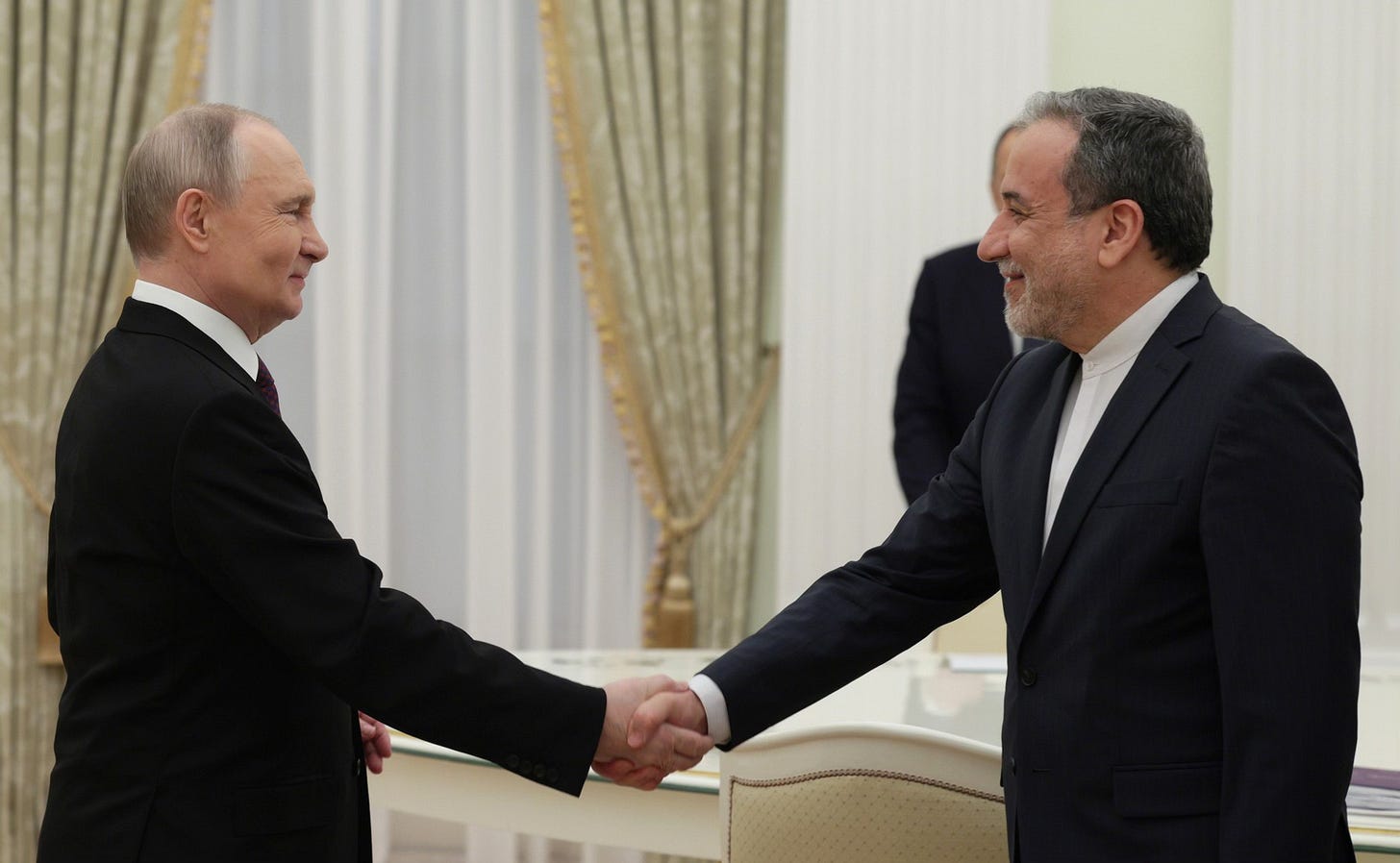Walk in the Woods: US-Iran Peace
US Special Envoy Steve Witkoff and Iranian Foreign Minister Abbas Araqchi
Welcome to MT799 Authenticated, Barbershop Whispers….Russia's (BWR) independent contributors column.
Given the US bombing of Iran’s nuclear enrichment facilities last week and the potential for direct talks between the US and Iran, I have asked Dr. Kenneth Dekleva to share his thoughts on what strategies the two sides can use for successful negotiations to achieve peace.
Dr. Dekleva is a renowned practicing psychiatrist with decades of experience with the US State Department and profiling international leaders. He is also a frequent contributor to the MT799 Authenticated column. His last piece was “¿Mamá, Es Verdad Que Somos Rusos?—Children of Spies, Diplomats, and International Businessmen”.
Following the recent Israeli and American bombing of Iran’s nuclear sites, and pending a fragile cease-fire, President Trump has stated that American and Iranian diplomats plan to return to the negotiating table in hopes of reaching a diplomatic solution to Iran’s likely damaged nuclear weapons program. Such negotiations between enemies are sure to be challenging. In 1978, the late Uri Lubrani, Israel’s last Ambassador to Iran, accurately predicted the fall of the Shah and the rise of the 1979 Islamic Revolution.
Lubrani, who later became known as Israel’s ‘Mr. Iran,’ always warned Westerners (as well as his Israeli colleagues) about the perils of negotiating with the Iranians, whom he respected for their negotiation prowess, calling their manipulation of talks,
“a masterpiece of hoodwinking the world…Bear in mind three things: They have 3,000 years of culture; they’re patient – a nation of carpet-weavers, and of chess players.”
So, Lubrani’s wisdom is worth noting as President Trump’s special envoy Steve Witkoff envisions a return to diplomatic negotiations with his Iranian counterpart, Foreign Minister Seyyed Abbas Araqchi, in today’s 21st-century version of ‘The Great Game.’

Messrs. Witkoff and Araqchi would do well to recall similar, analogous Cold War challenges during tense, complex American-Soviet arms control negotiations in the 1980s. In 1982, in the woods outside Geneva, the renowned American arms control negotiator Paul Nitze and his Soviet counterpart Yuli Kvitinsky stepped away from their negotiating teams and took a long ‘walk in the woods,’ then sitting on a forest log, trying to resolve a serious negotiating impasse.
Their walk in the woods was even memorialized in a 1988 play by Lee Blessing, highlighting the negotiators’ developing, closer, and personal relationship, despite their—and their respective countries '- profound diplomatic differences.
What this forgotten Cold War story tells us is that, in diplomatic negotiations, empathy, shared humanity, and noble aspirations—while hardly a guarantee of success—still matter. Steve Witkoff brings decades of business negotiation experience—developed in the rough and tumble world of New York commercial real estate—to the challenges of negotiating in the Middle East and Ukraine. As a negotiator, Witkoff has spoken about the importance of empathizing and walking in his counterparts' shoes. Having lost a son to a fentanyl overdose, he deeply understands the pain of sorrow and grief. When negotiating with his Iranian counterpart, whose country lost over 1 million people in the 1980-1988 war with Iraq, Witkoff’s empathy—something he has discussed in terms of dealing with families of hostages—may prove valuable. Witkoff’s negotiating partner, Foreign Minister Araqchi, has also experienced both great success and profound loss, having lost his father at 17 and served in combat during the Iran-Iraq War before pursuing his diplomatic career.
Iran, badly wounded in the past year by a combination of Israeli and American military power, along with significant intelligence victories by Mossad, remains a proud, civilization-rich nation of 90 million people, most of whom are under 40. To reach a lasting negotiated settlement, Witkoff and Araqchi must depend on all their negotiation and diplomatic skills. Besides technical, scientific, and diplomatic issues, negotiations should also address the human element, social psychology, and the aspirations of Iran—whose nuclear program has been destroyed, but who still possesses spirit, youth, energy, history, national pride, and connections to a large Iranian diaspora that can inspire hope in the Middle East, rather than reverting to the failed policies of Ayatollah Khomeini’s theocratic Islamic Revolution.
Witkoff has become known for favoring close, one-on-one negotiations with his counterparts, a stance not appreciated by traditional U.S. State Department diplomats. For this, he has been labeled naïve and out of his depth. But such assessments, considering the complex, human, and emotional factors in negotiations with Iran, may be off the mark. Perhaps Witkoff should borrow a page from Paul Nitze and Yuli Kvitinsky and suggest that he and Araqchi take a ‘walk in the woods,’ allowing a deeper, more personal negotiation to develop. This calls for boldness, imagination, and creativity, and prompts us to wonder what an Iran at peace with its neighbors might look like. Where might Iran fit into the framework of an Abraham Accords 2.0?
Witkoff’s boss (and author of The Art of the Deal), President Trump, is famous for his unconventional, intuitive, and bold approaches to diplomatic negotiations. This was evident during his outreach to North Korea’s Chairman Kim Jong-un in 2018-2019, and more recently, in his efforts to persuade Russia’s President Vladimir Putin to seek an end to the tragic, genocidal Ukraine war. In the upcoming negotiations with Iran, Witkoff offers a significant advantage beyond his negotiating skills: he has President Trump’s trust.
Similarly, Iran’s Foreign Minister Abbas Araqchi also has the trust of Iran’s ailing (he has late-stage prostate cancer) Supreme Leader Ayatollah Khamenei, who, like his predecessor the late Ayatollah Khomeini, must strike a deal with the hated Americans—once again drinking from the ‘poisoned chalice’—to save Iran. This has clear implications for Russia’s Vladimir Putin, North Korea’s Kim Jong-un, and China’s Xi Jinping, who are watching closely. Will a new, 21st-century ‘walk in the woods’ succeed and bring peace to the Middle East?
About the Author:
Dr. Kenneth Dekleva served as a Regional Medical Officer/Psychiatrist with the U.S. Dept. of State from 2002-2016 and is currently a Professor of Psychiatry and Director of Psychiatry-Medicine Integration UT Southwestern Medical Center, Dallas, TX; he is also a Salzburg Global Fellow at the Salzburg Global Seminar and a Senior Fellow at the George H.W. Bush Foundation for US-China Relations. He is the author of three novels, The Negotiator’s Cross, The Last Violinist, and most recently The Russian Diplomat’s Wife.
The views expressed are entirely his own and do not represent the views of the U.S. Government, the U.S. Dept. of State, or UT Southwestern Medical Center.
Vol 3, No 27 - BWR (MT799) 02.07.2025
Thank you for reading “Barbershop Whispers....Russia” written by Adam A Blanco! “Barbershop Whispers…Russia” is a product of e8Q Technologies, a consultancy with insights on all things Eurasia. Subscribe for free to receive new posts.










Great write up. One opinion: it is relatively easy to predict that which you cause.